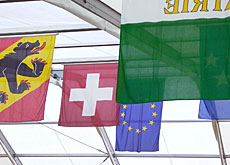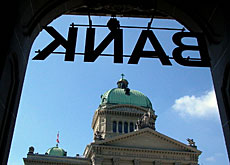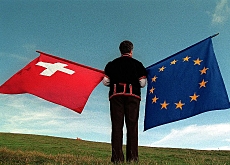Think tank boss warns against complacency

Switzerland should preserve its tax advantages and address some pressing issues with Europe, the head of think tank Avenir Suisse tells swissinfo.
Thomas Held said that while Switzerland had some of the same problems as the European Union, including an ageing population, the country’s economy was currently benefiting from its international outlook.
He admitted that reforms were slow in some areas but said some sectors were more open and transforming as a result of globalisation.
Held was speaking earlier this month on the sidelines of the St Gallen Symposium in eastern Switzerland which was devoted to Europe’s future role in the world.
Although Switzerland is not a member of the EU, it is heavily dependent on the EU’s markets, and the policies of Brussels can have major consequences.
swissinfo: Does it matter that Switzerland is not a member of the European Union?
Thomas Held: I guess in one respect it matters and that is when one starts asking what is the key factor for this relative [economic] success or what is one of the big differences. Then you look at the labour market. The Swiss labour market is much more flexible than most others in continental Europe.
A big question is also tax competition. One sees now in Europe an increasing tax competition from new [EU] member countries… The Swiss must be very careful not to lose their competitive advantage.
swissinfo: If you don’t change, there’s a danger you’ll fall behind. Several speakers said that in St Gallen. How is Switzerland changing?
T.H.: On the one hand it is not changing. We see the same blockages, for example with the reform of the social welfare system… If you look at agricultural policy, it’s the same thing.
But there are changes in international developments. If the international sector gets stronger, more Swiss companies participate in the world economy, so to a certain extent Switzerland is changing towards a service economy, towards a knowledge-based economy.
swissinfo: Do you think that the changes are fast enough?
T.H.: No, generally they are not fast enough. The government has just presented the new agricultural policy report and there is nothing new there, so change is very slow.
But the dynamic in the financial or pharmaceutical sector is strong. The question is whether these companies really have enough activity in Switzerland to bring change in Switzerland itself.
swissinfo: What are the main changes that Switzerland will have to face sooner or later – issues that are not perhaps being addressed adequately now?
T.H.: I would mention two issues that are very much to do with Switzerland’s place in Europe. One is energy – a big issue of the future. If the Europeans develop a common energy policy, Switzerland is in an awkward position as a non-member because the conditions for future energy can be dictated by the EU. If Switzerland wants to establish some kind of independence it is imperative that new power plants are developed inside the country. And this means nuclear power plants because there is no other way… and this of course is not being addressed because it’s still a political taboo.
The second question that is underestimated is security. At the moment the costs for Switzerland are not extremely high. We have not been asked to participate in a meaningful way to share costs in the war on terrorism, and I guess the Swiss security situation – the lack of a police [force] at a federal level and maybe the different degrees of professionalism of cantonal police forces – will also be one of the big questions of the future, even though today no one thinks this is a problem.
swissinfo, Robert Brookes in St Gallen
The Organisation for Economic and Cooperation was upbeat about the Swiss economic prospects in its Economic Outlook published on May 23.
It expected the Swiss economy to grow by 2.4% this year, revising an earlier forecast up from 1.7%.
The OECD, of which Switzerland is a member, forecast “robust” growth of 1.8% for 2007.
However, the Paris-based organisation warned the improved outlook should not lead the Swiss government to cease efforts to control spending and implement reforms.
Avenir Suisse was founded in 1999 by 14 internationally operating Swiss companies.
As an independent think tank, it is involved in promoting the social and economic development of Switzerland.
It is not a lobby group. Its focus is on new ideas and the agenda setting for the future.

In compliance with the JTI standards
More: SWI swissinfo.ch certified by the Journalism Trust Initiative



You can find an overview of ongoing debates with our journalists here. Please join us!
If you want to start a conversation about a topic raised in this article or want to report factual errors, email us at english@swissinfo.ch.